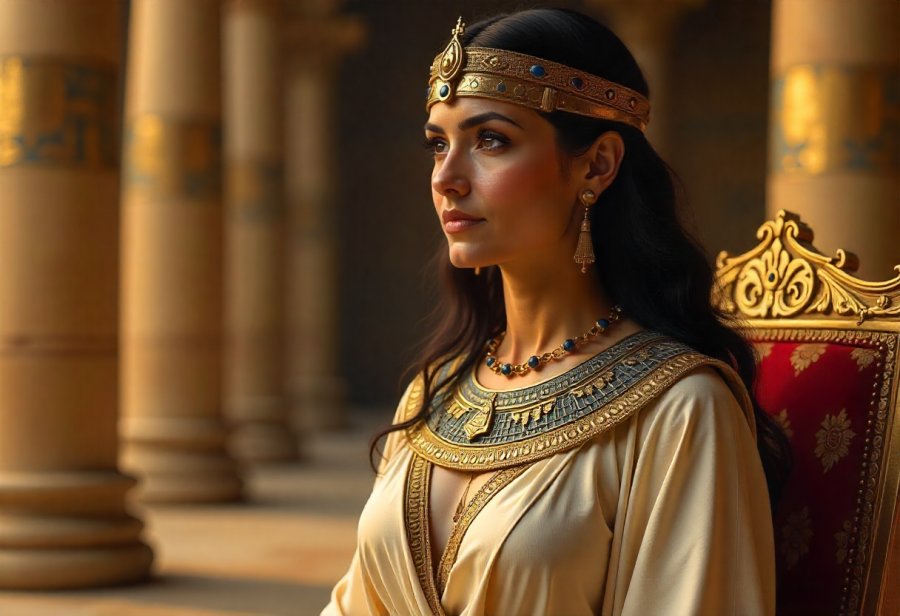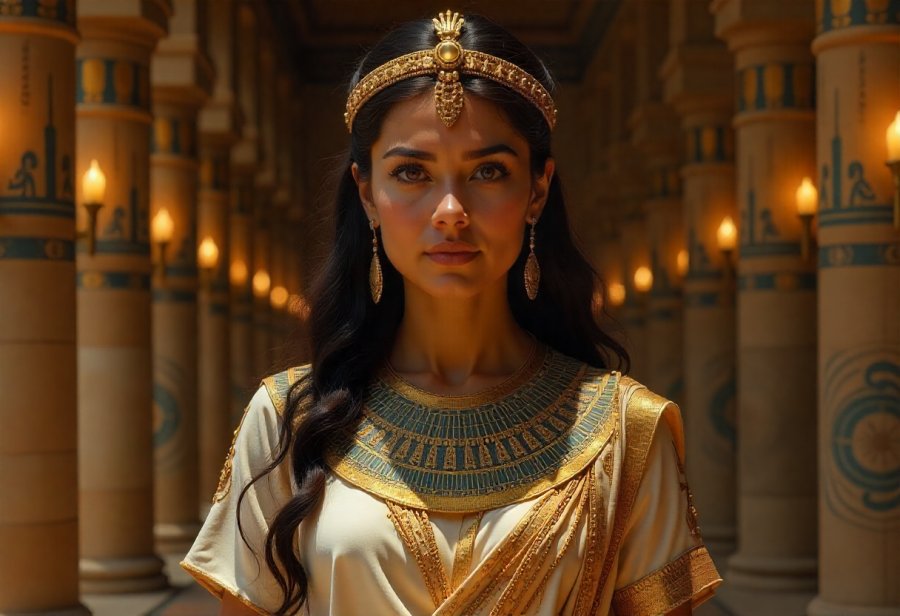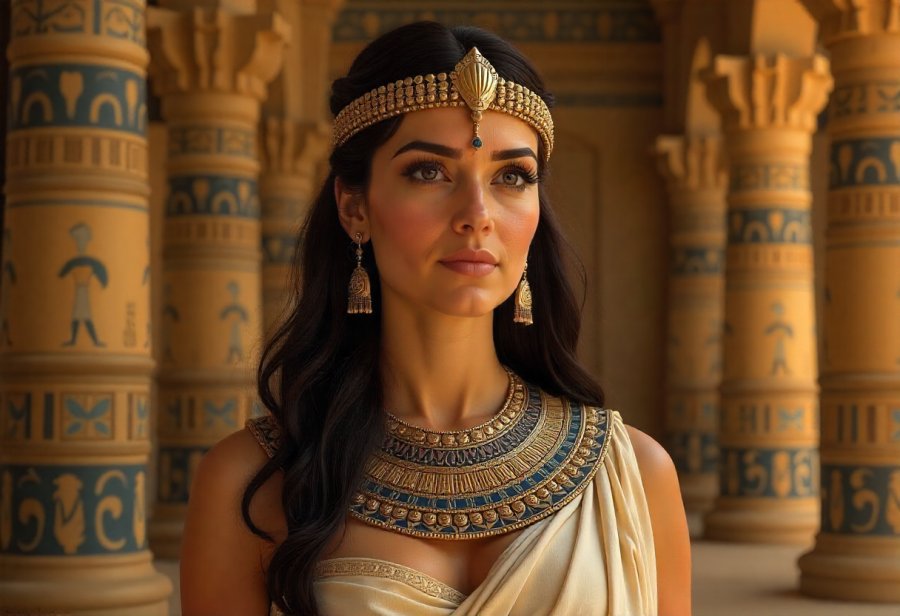When Cleopatra VII is mentioned, most envision her as a glamorous seductress, but her true legacy lies in her extraordinary intellect and strategic mastery. Could her influence have been rooted more in wisdom and diplomacy than beauty? This portrayal reveals a ruler deeply engaged with philosophy, science, and languages, using her scholarly pursuits and cultural literacy as tools of power. Her ability to forge alliances with figures like Julius Caesar and Mark Antony was based on calculated moves, not chance—highlighting her skill in negotiation and persuasion. Cleopatra’s mastery of multiple languages and patronage of Alexandria’s legendary library exemplify her belief that knowledge and understanding were her greatest assets. Her story challenges us to reconsider leadership’s true source of strength, showing that influence built on intelligence, cultural fluency, and adaptability endures beyond superficial allure—reminding us that the most enduring power resides in the mind.

Unveiling Cleopatra’s True Power: Mind Over Glamour
When most people think of Cleopatra VII today, they picture her as a glamorous figure of beauty and romance, a symbol often shaped by Hollywood’s portrayal. But that image tends to overshadow what truly made her a remarkable leader: her sharp mind and strategic intelligence. Cleopatra was far more than a seductress; she was a highly educated monarch, fluent in multiple languages, and deeply engaged in politics, philosophy, and science. Her influence stemmed from her ability to think ahead, negotiate skillfully, and wield influence with subtlety—traits that made her a formidable ruler in a male-dominated world.
Her legacy isn’t just about her relationships with Julius Caesar and Mark Antony, but about her mastery of diplomacy and strategic vision. Cleopatra understood that influence was rooted in knowledge, language, and perception. She used her intellect to build a web of alliances, protect her kingdom’s sovereignty, and adapt to a rapidly changing political landscape. Her leadership was driven by her ability to see beyond immediate threats and craft long-term solutions, making her a master strategist.
Behind the scenes, Cleopatra’s scholarly pursuits played a crucial role in her leadership style. She spoke several languages, including Egyptian, Greek, and Latin, which allowed her to communicate directly with foreign leaders and scholars. Her patronage of the Library of Alexandria reflected her commitment to learning and the pursuit of knowledge. This dedication wasn’t just personal; it was a key tool in her diplomatic arsenal, enabling her to influence others and gather vital information that shaped her decisions.
Her education extended into her personal interests in philosophy, rhetoric, and sciences, sharpening her analytical skills and broadening her worldview. Cleopatra believed that wisdom and understanding were essential to effective rule. This mindset helped her craft policies rooted in strategic insight rather than impulsive reactions, giving her a long-term advantage even as external pressures grew. Her ability to combine intellectual curiosity with political savvy set her apart from many of her contemporaries.
Her multilingualism and cultural literacy gave her a unique edge in diplomacy. By speaking Egyptian, Greek, and Latin fluently, she could directly engage with diverse audiences, fostering trust and respect. This genuine connection enhanced her influence across different civilizations and helped her forge alliances based on understanding rather than coercion. Her command of language and culture demonstrated that true power in leadership comes from knowledge and effective communication.
Many stories focus on Cleopatra’s beauty and charm, but her true strength lay in her mind. She used her intelligence, education, and diplomatic skills to navigate complex international waters and maintain Egypt’s independence. Her ability to influence through persuasion, strategic negotiation, and cultural literacy shows that leadership rooted in wisdom and influence can be more enduring than superficial attributes. Her story continues to remind us that real power comes from mental agility, learning, and the capacity to shape perceptions—skills that remain vital for leaders today.
Context in Chaos: Cleopatra’s Rise Amidst Turbulent Times
Cleopatra VII’s rise to power took shape amid a backdrop of shifting alliances and internal upheaval in Egypt’s history. Her family, the Ptolemaic dynasty, was of Greek-Macedonian origin, established after Alexander the Great’s empire fractured. Though they adopted some Egyptian customs, their rule was primarily marked by Greek cultural dominance and political intrigue. Cleopatra inherited a fragile throne, facing rival factions eager to seize power and external pressures from expanding neighbors, especially Rome. Her ability to navigate these turbulent waters was essential to maintaining her authority.
Born around 69 BCE, Cleopatra came to the throne at a time when Egypt was caught between tradition and external influence. Her father, Ptolemy XII, struggled to keep Egypt independent as Rome’s influence grew across the Mediterranean. Ascending to power at about 18, Cleopatra quickly recognized that her survival depended on strategic diplomacy. Her extensive education—covering philosophy, rhetoric, and sciences—prepared her to confront internal rivalries and external threats with intelligence and resolve.
Cleopatra’s diplomatic approach centered on balancing Egypt’s sovereignty with the rising dominance of Rome. Her relationships with Julius Caesar and later Mark Antony weren’t driven by personal vanity but by calculated moves to secure her kingdom’s future. She understood that alliances could tip the balance of power, and her mastery of negotiation allowed her to adapt swiftly to the shifting political landscape. Despite Egypt’s wealth and cultural vibrancy, external pressures constantly threatened its independence, making her strategic agility vital.
Throughout her reign, Cleopatra demonstrated an acute awareness of the international scene. Her fluency in Egyptian, Greek, and Latin enabled her to communicate directly with diverse leaders and scholars, bypassing intermediaries and reducing misunderstandings. Patronizing the Library of Alexandria and engaging with the brightest minds of her time, she fostered knowledge as both a personal pursuit and a strategic asset—strengthening her influence through education and cultural literacy.
Her leadership was rooted in understanding complex political and cultural dynamics. She read her environment carefully, forging alliances based on mutual benefit rather than coercion. This ability to see beyond immediate threats allowed her to craft policies that protected Egypt’s independence and extended her influence across civilizations. Her strategic vision and diplomatic skill transformed her into a formidable ruler whose legacy endures beyond her time.
In a world where military might was often the default, Cleopatra proved that influence rooted in intelligence, culture, and negotiation could be more effective and sustainable. Her ability to read circumstances, adapt to change, and build genuine relationships made her a model of resilient leadership. Her story offers a timeless lesson: true power arises from the capacity to understand, communicate, and influence on a strategic level, shaping history through wisdom rather than force.

Mastering Influence: Cleopatra’s Diplomatic and Intellectual Edge
Cleopatra’s true mastery lay in her ability to seamlessly blend strategic insight with diplomatic finesse, making her one of history’s most adaptable and effective leaders. She understood that influence depended less on brute force and more on perception, negotiation, and building trust. Her skill in navigating the complex political landscape was evident in her carefully crafted alliances with figures like Julius Caesar and Mark Antony—relationships built on calculated moves rather than chance. These alliances weren’t mere personal connections; they were strategic tools designed to strengthen Egypt’s position and her own authority, often turning potential threats into opportunities for growth.
Beyond politics, Cleopatra’s commitment to scholarship and learning formed a core part of her leadership style. Fluent in Egyptian, Greek, and Latin, she could communicate directly with foreign leaders and scholars, bypassing intermediaries that might distort her message. Her patronage of the Library of Alexandria exemplified her dedication to knowledge, fostering an environment where ideas, innovations, and wisdom could flourish. This intellectual engagement wasn’t just personal curiosity; it became a vital tool for influence, allowing her to gather critical information and craft more effective diplomacy.
Her scholarly pursuits extended into philosophy, rhetoric, and sciences, sharpening her analytical skills and broadening her worldview. Cleopatra believed that wisdom and understanding were essential for effective governance. This mindset helped her develop policies rooted in insight rather than impulsiveness, enabling her to adapt swiftly to shifting circumstances. Her ability to combine intellectual curiosity with political savvy set her apart from many of her contemporaries, giving her a reputation as a ruler who valued knowledge as much as power.
Her command of multiple languages gave Cleopatra a distinctive edge in diplomacy. She could speak Egyptian, Greek, and Latin fluently, which allowed her to engage directly with diverse audiences, fostering genuine trust and respect. This cultural literacy enabled her to forge alliances based on mutual understanding, crucial for maintaining Egypt’s independence amid rising Roman influence. Her linguistic skills were more than signs of intelligence—they were powerful strategic assets that helped her influence across civilizations and forge relationships on her own terms.
Many stories focus on Cleopatra’s beauty and charm, but her true strength lay in her mind. She used her education, language skills, and diplomatic acumen to navigate international waters, outmaneuver rivals, and preserve her kingdom’s sovereignty. Her reputation as a scholar-queen underscores that leadership rooted in wisdom, cultural literacy, and strategic thinking can be more enduring than superficial attributes. Cleopatra’s legacy reminds us that influence and power come from continuous learning, mental agility, and the ability to influence through knowledge—traits just as relevant today as they were in ancient times.
For those interested in exploring further, understanding Cleopatra’s diplomatic strategies can be enriched by studying her use of influence and leadership principles. To delve deeper into her methods and the broader context of her reign, you can explore her story through this detailed article on Cleopatra’s diplomatic and leadership techniques.
Lessons from the Queen: Applying Cleopatra’s Strategies Today
Cleopatra’s leadership offers lessons that remain remarkably relevant in today’s complex world. She showed that strategic thinking often outweighs raw military strength, emphasizing the importance of understanding the full landscape before making a move. Rather than relying solely on force, Cleopatra prioritized building alliances that served long-term interests, turning potential threats into opportunities through careful negotiation and insight. Her ability to see beyond immediate challenges to the bigger picture allowed her to navigate turbulent times with finesse.
Her relationships with powerful figures like Julius Caesar and Mark Antony highlight the value of diplomacy rooted in mutual benefit. Cleopatra understood that influence stems from trust and understanding, not coercion. This approach helped safeguard Egypt’s independence amid external pressures, demonstrating that influence built on dialogue and cultural literacy can be more enduring than dominance through force. Her example encourages modern leaders to focus on fostering authentic connections rather than superficial displays of power.
Cultural literacy and multilingualism were central to Cleopatra’s strategy. Speaking Egyptian, Greek, and Latin fluently enabled her to communicate directly with diverse leaders and scholars, strengthening her influence across civilizations. This genuine engagement fostered trust and opened diplomatic doors that might otherwise have remained closed. Today, embracing cultural awareness and continuous learning can elevate leadership, helping reduce misunderstandings and build meaningful relationships in an interconnected world.
Her patronage of the Library of Alexandria and engagement with scholars underscored the importance of knowledge as a strategic asset. Cleopatra understood that an informed ruler could navigate complexities more effectively, making decisions rooted in wisdom rather than reaction. Investing in education and curiosity isn’t just personal enrichment; it’s a vital leadership tool that shapes outcomes and enhances credibility. Leaders who prioritize learning foster resilience and adaptability.
Leadership rooted in wisdom and influence, rather than superficial charm or brute force, offers sustainability. Cleopatra demonstrated that intelligence, diplomacy, and cultural understanding create a resilient foundation for lasting power. By focusing on persuasion and strategic negotiation, she built a legacy that endured beyond her lifetime, proving that influence is often a product of mental agility and insight.
Her ability to read her environment and adapt swiftly teaches a timeless lesson: flexibility is key to long-term success. Modern leaders can learn from her example—being prepared to pivot, listen carefully, and adjust strategies to meet evolving challenges. Strategic agility often determines whether influence endures or fades with changing circumstances.
Ultimately, Cleopatra’s story encourages a broader view of leadership—one where influence is cultivated through education, cultural literacy, and strategic foresight. Her mastery of influence through intellect and diplomacy underscores that true power arises from understanding, communication, and wisdom. These lessons remain vital today, reminding us that leadership built on knowledge and authentic connection can shape history just as profoundly as any external force.

Legacy of Wisdom: Celebrating Cleopatra’s Enduring Power
Cleopatra’s legacy is best understood as a testament to the true source of power: the mind. Her influence stemmed from her intelligence, strategic thinking, and diplomatic skill—traits that allowed her to navigate a turbulent world and secure her kingdom’s independence. She relied less on superficial charms and more on her mastery of knowledge, language, and perception, proving that leadership rooted in wisdom endures far longer than fleeting appearances.
Her ability to read her environment, craft nuanced diplomacy, and build genuine alliances set her apart. Cleopatra understood that influence is a product of understanding others, effective communication, and strategic foresight. Through her education and cultural literacy, she forged relationships based on trust and mutual benefit, often turning potential threats into opportunities for growth. This approach created a legacy that transcended her own time and continues to inspire.
Rather than relying on brute strength or superficial allure, Cleopatra demonstrated that influence built on intelligence and cultural savvy is more resilient. Her command of multiple languages and patronage of learning positioned her as a leader who valued knowledge as a strategic tool. Her leadership style shows that a ruler’s true power lies in the ability to inspire confidence, foster trust, and adapt to changing circumstances—skills rooted in mental agility and insight.
Her story underscores that effective leadership is a continuous pursuit of learning and understanding. Cleopatra’s adaptability, her willingness to pivot and listen, allowed her to stay ahead of political shifts and maintain her influence. She exemplifies a timeless lesson: flexibility and strategic thinking are essential for lasting impact. Her legacy reminds us that influence grounded in wisdom and genuine connection can shape history in profound ways.
Celebrating Cleopatra’s true power means shifting the focus from myth and superficial attributes to her extraordinary intellect and strategic brilliance. Her influence was forged through wit, education, and cultural literacy—tools that remain vital for leaders today. Her story encourages us to value continuous learning, critical thinking, and authentic engagement as essential qualities for lasting leadership. Cleopatra’s example proves that the most enduring power comes from the mind.






